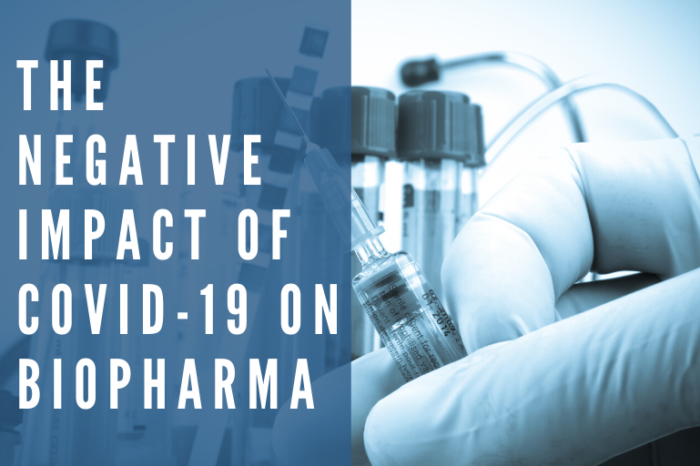Study Finds Pandemic Likely to Negatively Impact Biopharmaceutical Sector
Threats to intellectual property, political pressure to lower prices, disruption of clinical trials will cause long-term harm
BOSTON – Contrary to conventional wisdom that says the coronavirus pandemic will generally benefit biopharmaceutical companies, a new Pioneer Institute study finds many companies will emerge from the pandemic commercially weaker, dealing with delays in new product launches and with fewer resources to invest in research and development.
“There will certainly be worldwide demand for COVID-19 treatments,” said William Smith, author of “The Negative Impact of COVID-19 Upon the Biopharmaceutical Sector.” “But they will also require massive investments in clinical development and manufacturing, and political pressure on pricing makes it impossible for companies to recoup those investments.”
Cipro is an antibiotic well-suited to treat anthrax, which began arriving in mailboxes in the weeks after September 11, 2001. The Centers for Disease Control recommends that patients exposed to the bacteria take Cipro twice a day for 60 days. Despite the fact that the entire course of treatment would only cost $219, Bayer agreed to cut the price in half after the U.S. Secretary of Health and Human Services at that time threatened to take away the company’s patent.
More recently, when Gilead announced it would invest $1 billion in Remdesivir, a promising COVID-19 treatment, one would have thought the company’s stock would rise. Instead, it fell 5 percent. A number of analysts remarked that the reason was fears that political pressure would result in very low prices or threats to Gilead’s patent.
Some investors and industry leaders may conclude that investments in major public health emergencies should be avoided in favor of research on lifestyle treatments or medications for less serious conditions that aren’t accompanied by threats to intellectual property or pressure to reduce prices.
Political pressure to cut prices is likely to be most acute in the area of vaccines, where the federal government is providing grants to companies such as Johnson & Johnson and Moderna. Many policymakers will likely see any new vaccine that emerges from research that was partially funded by the government as public property.
“There may be humanitarian reasons why companies choose not to profit from their treatments,” said Pioneer Executive Director Jim Stergios. “But policymakers should also be aware that threats to intellectual property create significant disincentives to investment.”
In 2018, Massachusetts institutions received nearly $3 billion in National Institutes of Health funding, the second highest amount among the states. That same year, private venture companies invested $4.8 billion in the Commonwealth’s life sciences companies. In terms of new businesses, more than a third of U.S.-based biotechs that went public in the first half of 2019 were Massachusetts-based.
These companies also face delays in clinical trials for non-COVID-19 treatments, which could significantly disrupt long-term product pipelines. Since firms typically file patents before clinical trials begin, significant delays eat up the period during which treatments can be sold under patent before opening up to competition from generic makers.
The delays are particularly damaging to small firms, whose future may depend on a successful trial.
Smith’s recommendations include extending patent life on products by the period clinical trials were delayed by the pandemic, and that COVID-19 treatments in which companies made significant investments should be priced to allow a reasonable return on that investment.
About the Author
Dr. William S. Smith is Visiting Fellow in Life Sciences at Pioneer Institute. He writes about public policy issues impacting the life sciences industry with particular emphasis upon pharmaceuticals. Dr. Smith has 25 years of experience in government and in corporate roles. He spent ten years at Pfizer as Vice President of Public Affairs and Policy. He later served as a consultant to major pharmaceutical, biotechnology and medical device companies, and was President of a small medical device company for three years. His career has also included senior staff positions for the Republican House leadership on Capitol Hill, the White House, and in the Governor’s office in Massachusetts. He is affiliated as Research Fellow and Managing Director with the Center for the Study of Statesmanship at The Catholic University of America (CUA). He earned his PhD at CUA and a bachelor’s degree from Georgetown University.
Mission
Pioneer Institute develops and communicates dynamic ideas that advance prosperity and a vibrant civic life in Massachusetts and beyond.
Vision
Success for Pioneer is when the citizens of our state and nation prosper and our society thrives because we enjoy world-class options in education, healthcare, transportation and economic opportunity, and when our government is limited, accountable and transparent.
Values
Pioneer believes that America is at its best when our citizenry is well-educated, committed to liberty, personal responsibility, and free enterprise, and both willing and able to test their beliefs based on facts and the free exchange of ideas.
Get Our COVID-19 News, Tips & Resources!
Related Content










